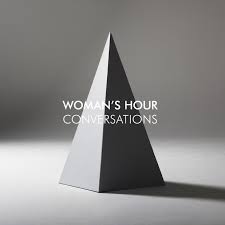Humanity is seemingly trying harder than ever to pretend that broken relationships aren’t that big of a deal. To speak directly of the pain they cause amounts to whining. But no matter how rip-roarin’ your divorce party is, and no matter how conscious you are of your uncoupling, the facts remain – a breakup happens when one person realises they don’t want to be around the other person anymore, and that sucks for both of them. Maybe I’m just throwing around broad generalisations here, but I’m doing so in an attempt to explain why the debut record from the London-based quartet Woman’s Hour sounds so refreshing. It shouldn’t really, because its brand of pretty, rain-spattered synth-pop has the requisite 1980s echoes seemingly required of indie bands these days. It’s far from the only kid in school with The Cure patches on its backpack.
Yet Conversations is special. When parsing out why, it’s probably smart to begin with singer Fiona Burgess, who lets the inherent drama of the material lead the way, her voice a soothing mid-register guide through the emotional wreckage. Every song is about an incipient breakup, but none of them feel like a slog. When she asks, "If I stop, and cease to exist/Would it be better for you," it’s without adornment, and it sounds earnest. When writing this review, I fought the urge to criticise such a line for its heated grandiosity, because when people break up, there’s at least a week or two where heated grandiosity is the only language spoken. It’s a trick Burgess pulls off over and over again – pulling us bystanders in, rather than walling us off with theatre.
Burgess also spends most of her time in the shoes of an under-explored perspective in the breakup album canon – that of the clear-headed breakup instigator. She speaks hurtful truths about the connections that weren’t made, the things she would have done if she were in your shoes, the rhythm that’s been lost. There’s no guilt or anger there, just sad realisation and adult honesty. Even when singing about the unbearable weight of jealousy on ‘Her Ghost’, Burgess doesn’t lose focus – she forgives, then forgets, and is on the path to recovery by the end of the chorus. When someone unleashes feeling of rage on record, it’s standard to call it a display of "raw" emotion. But Conversations is certainly raw as well, in the sense that these tender, mournful songs have not been overdramatised. They feel like those 3am talks after a long night of fighting, where the truth comes out, quietly.
It also doesn’t hurt that the music supporting Burgess is indebted to the gorgeous synthetic deserts of Disintegration – atmospheric keyboards provide ballast for guitarist and Burgess’ brother William’s shimmering, reverb-washed eighth notes. Subtle production touches do push the group closer to its own sound, like the multi-tracked vocal coda to ‘Darkest Place,’ which layers them ever so slightly off to make them sound like crickets. Or the backup vocals to ‘Our Love Has No Rhythm,’ which are so rough that they almost sound flat – a howl at the moon to counterpoint Fiona Burgess’ reasoned approach to love’s end.
By embracing its influences with as much lithe confidence as it embraces the idea of endings, Woman’s Hour avoid sounding derivative by making pop music that looks you in the eye. If you meet their gaze, you won’t find any tears, but you will find understanding.
<div class="fb-comments" data-href="http://thequietus.com/articles/16032-womans-hour-conversations-review” data-width="550">


